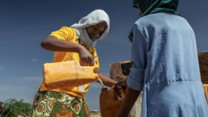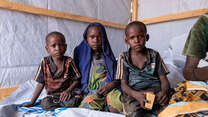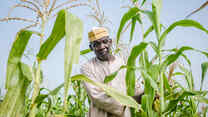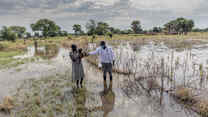WHO WE ARE
The mission of the International Rescue Committee (IRC) is to help people whose lives and livelihoods are shattered by conflict and disaster to survive, recover and gain control of their future. Our vision is that the IRC will lead the humanitarian field by implementing high-impact, cost-effective programs for people affected by crisis, and shape global policy and practice by sharing our learning and experience with others. All IRC programs are designed to achieve meaningful change in people’s health, safety, education, economic wellbeing and ability to influence the decisions that affect their lives.
The Environmental Health (EH) team at the IRC aims to protect people from Water, Sanitation and Hygiene (WASH) related diseases through the provision of adequate water supply, sanitation and the promotion of safe hygiene practices.
WHY OUR WORK MATTERS
Access to safe and reliable drinking water, basic sanitation, and positive hygiene practices are fundamental for the health and survival of all people and play a critical role in reducing risk of disease. The consequences of poor access to safe water, sanitation and hygiene are wide reaching:
- Severe health consequences: Poor environmental health is linked to the transmission of infectious diseases including hepatitis E, cholera, and other diarrheal diseases. Diarrhea kills an estimated 801,000 children every year and remains a leading cause of death for children under 5.
- Impacting nutrition: Water-borne illnesses contribute to undernutrition in all forms – including acute malnutrition – which can have life-long implications on physical and cognitive growth and development.
- Lost time: Hours are wasted every day as people collect water and seek safe and private places to defecate. This is not only a burden physically – with people often traveling long distances for access – but also costs valuable time that could be spent at school, at work, at home, or doing other important activities.
- Barriers to education: Children lose learning time or drop out of school completely due to inadequate safe water and sanitation provision at home and in school.
- Increased danger to women and girls: Not only do women and girls bear the brunt of the burden of water collection, but inadequate sanitation is also more challenging for women and girls who experience menstruation, face greater risk of assault – especially when accessing at night – and have different gender norms, including around privacy.
Today, two billion people lack access to basic sanitation facilities such as toilets or latrines and 785 million people still use unsafe drinking water.
WHAT WE DO
In acute emergencies, the IRC establishes emergency water, sanitation and hygiene promotion programs, ensuring that life-saving services can be initiated efficiently. For example, the IRC worked with local partners in Syria, providing water and sanitation facilities and services that are essential for life, personal safety and dignity.
As countries evolve from emergencies to rebuilding, the IRC works to build stronger community and government oversight on improved water, hygiene and sanitation services, and maintenance of systems. We also collaborate with communities on issues such as climate change and disaster risk management to ensure communities have the resources needed to survive in a changing world. IRC's EH programs are based on principles of human centered design, good engineering, evidence and public health, and conform to internationally recognized minimum standards of humanitarian assistance.
IRC EH practitioners provide technical assistance to more than 30 country programs with a focus on:
Promoting safe hygiene practices:
The IRC promotes hygiene practices consistent with good health including hand washing, proper waste disposal, safe methods for managing water, and menstrual hygiene management – a key issue impacting adolescent girls' ability to stay in school. In a typical year, the IRC’s hygiene promotion reaches over three million people through mass media and direct contact with communities. Hygiene promotion is proven to be one of the most effective and cost-efficient approaches to improving child health.
Ensuring access to essential water and sanitation services
The IRC provides vulnerable communities with a range of essential environmental health services including water, sanitation, and handwashing facilities and supplies like soap. These aspects are collectively critical to supporting a community’s health and hygiene. In a year, the IRC provides more than five million people with access to safe water and improved sanitation, either through direct provision – including maintenance of rehabilitated or new water systems – or by providing them with the skills and resources to build their own facilities. This occurs at the community, household, and health facility levels.
Our strategies for impact in environmental health include utilizing behavior change communication; prioritizing community engagement; Strengthening institutions to sustain services; Emphasizing equity and inclusion; and building the evidence base through dedicated research and learning.



